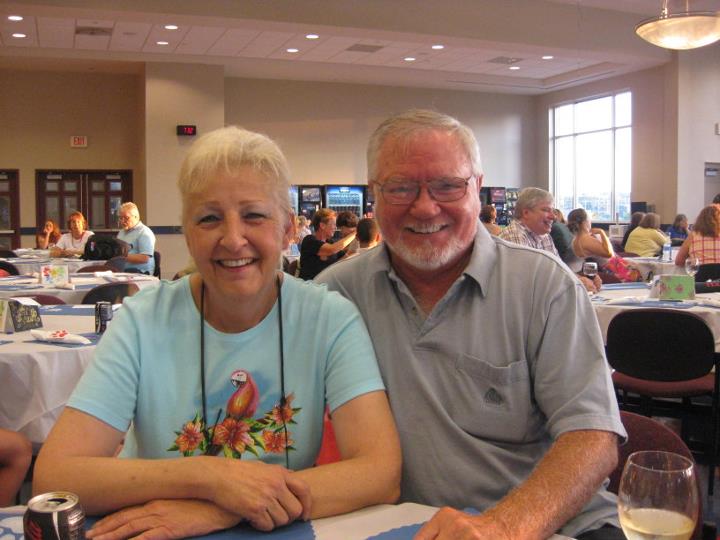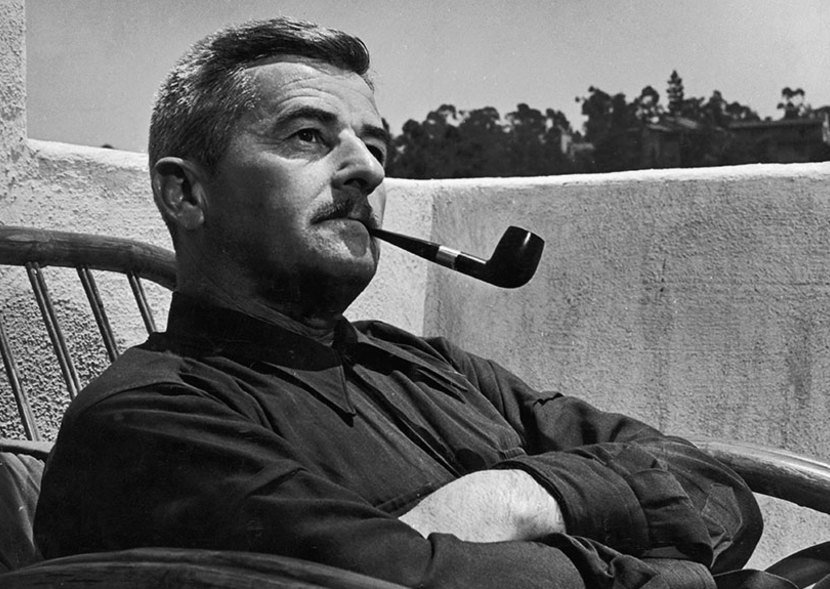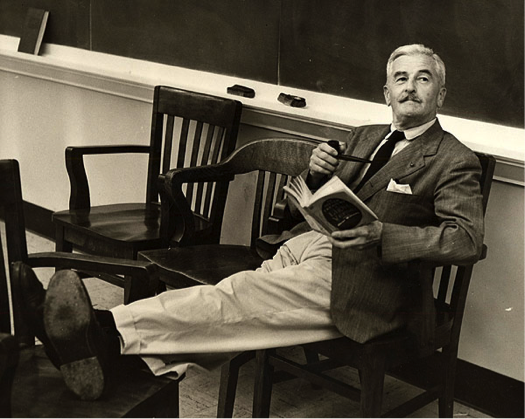Featured
Reflections: Hunting Trips with William Faulkner

Jay Mitchell and his wife.
In my youth, growing up in “Faulkner Country,” I didn’t think of him as a hunter or a lover of the wilderness, although my first encounters with him had something to do with hunting.
I was squirrel hunting in his “Woods” when he shot at me. I was a dog handler on a fox hunt with him. But when I saw him in his strange English costume walking around town, I couldn’t see anything that we might have in common.
Years later, after forcing myself to read more of his work, I began to find words in his hunting stories that awakened wonderful memories of my childhood. He must have been there; no one could describe the things that he did without experiencing it for one’s self.
You had to see the Virgin Forest of the Mississippi Delta in order to paint the pictures as he did. If you never stood or sat in the woods at night, listened to the dogs run, recognized the voice of each individual hound and knew which dog was leading the pack, then you can’t write about it like he did. The little “city-slicker” must have experienced these long gone Southern traditions of “right of passage” into manhood.
Not that his stories revived my memories of growing up and looking forward to the annual hunt – these memories were always with me. But it caused me relate with Faulkner as more of the common people that I grew up with.
I know that I repeat myself, but I don’t have Faulkner’s words and I have a long story to tell.
I started shining shoes in an Oxford barbershop when I was 8 years old. My dad became a barber after we left the share-cropping life of the Delta. He and I still farmed at night in order to make ends meet. He was a storyteller, bordering on being a liar; I hated it when he made me verify one of his exaggerated stories, but it was agree with him or get an ass-whipping when we got home.
My dad was very likable and made a lot of friends in Oxford. His stories of growing up in the Delta, living in a tenant house on the banks of an Old Coldwater River channel and working as a sharecropper during the Depression fascinated many of the more sophisticated people that came to the shop.
He would tell stories of the yet uncut Virgin Forest where he hunted as a boy and the abundance of wild game that must still be there.
Jefferson and Yoknapatawpha County were what we Delta people called “the Hills,” excepting the two river bottoms that ran into the Delta. Most of it by the late ’40s and early ’50s had been clear cut or was in cultivation, not much forest left and very little game.
By this time, the bears, panthers, deer and turkeys had been killed by the poor people trying to make it through the Depression. We had no deer and if you wanted to deer hunt, you had to know some rich person that owned land across the levee. But in the ’30s, the uncut forest on the east side of the levee still had abundant game.
 Faulkner knew people on both sides of the levee and from reading his stories, I am sure that he took advantage of many of these acquaintances.
Faulkner knew people on both sides of the levee and from reading his stories, I am sure that he took advantage of many of these acquaintances.
I mentioned earlier that I had a great uncle that retired from his Delta plantation and moved to Oxford to be closer to his beloved Rebel football team. He was known far and wide for his famous pack of Foxhounds. My dad and I were his dog handlers and one of the first great fox hunts that he put on after moving to Oxford and Yoknapatawpha County, William Faulkner was invited.
Several years later, I asked one of Oxford’s “big shots” that had been on that hunt why Faulkner was invited, and he told me that he, Faulkner and a few others from Oxford hunted several times with my uncle at his Delta farm hunting camp before he retired to Oxford (Sorry, but I don’t remember this. Damn, I wish I did).
Now for anyone that is paying attention, you might be asking yourself, “If his great uncle was so rich, why was his immediate family so poor?” Well, he was good to us; he would give us 21 acres of land if we moved next to him near Oxford and helped with the dogs. He also loaned my dad $3,000 to build us a house, which my dad did. Uncle Campbell had a cousin that was state governor, and he got my dad a barber’s license without my dad having to go to barber school. Let’s get back to the influence that Faulkner had on me.
After reading Faulkner’s “Big Woods,” “The Bear,” “The Old People,” “A Bear Hunt,” “Racing at Morning” and other short stories, I overlooked his over usage of words and saw that he was telling my story.
I remembered back to the Saturday night as we were closing the barbershop, about 9 o’clock. I was sweeping the last of the hair on the floor, and my dad handed me a Remington single-shot, .22 rifle and said, “You might need this for the next few days.” He told me that he had taken my shoeshine money and paid $9 for this rifle and it was mine. About that time several grown men started showing up at the shop – Mr. Joe Moore, Mr. Cooper, Mr. Vetry Alderson and a man that I loved but can’t remember his name. He was a U.S. federal marshal and a whiskey revenuer (It might have been Mr. Woods). It seemed like everybody was in on it but me. They congratulated me on my rifle but were excited about getting on the road.
Everybody was loaded and ready to go, but Daddy had to stop at our house on the way to pick up our dogs, and I rode with the federal marshal. He had a new souped-up Pontiac, and he drove like he was above the law. He and I stopped at the Panola-Quitman County line and he filled the trunk with beer and whisky.
The agent, whose name I can’t remember, told me that we were headed to the Delta for a four-day squirrel hunt. He said that my dad had made a trip or two down to his old stomping grounds and had set up a camp at the old tenant house where he grew up.
This place was about 70 miles from Oxford. I had been there before with Daddy, so he could show me how hard life had been on him. He always wanted me to know how good I had it. It was about six or seven miles west of the little town of Sledge, Mississippi, just across Six Mile Bayou. You turned off the main gravel road onto a field road that had never seen gravel or a road grader. If you were there after a good, rain you couldn’t make it in.
We didn’t have any four-wheel drive vehicles, but you will not believe how a ’39 Ford can go through mud or how a new ’49 Pontiac can role up gumbo mud on the fenders.
This was the beginning of an annual hunt that lasted for a few years, and the best part was that I was the only kid there.
My daddy never told me that he loved me, but these trips told me that he did.
We camped in the old tenant house, and Mr. Alderson and me were the camp cooks.
It was late at night when we got there, and we all went to bed right away … after a little drinking.
 Before daylight, everybody got up, and Mr. Alderson started breakfast while Daddy told everybody the lay of the land and who was to hunt where. When the sun came up and you could see, it was a sight that can’t be seen today. The old house had almost fallen in, there was enough roof left to keep us dry and the chimney had partly fallen in, but we could still cook on it. That didn’t matter. Mr. Alderson and I built a fire in the old front yard, and he put up two iron Y-shaped stakes with a metal rod across it. He hung a large cast-iron pot over the fire and added water. He would take a drink of whiskey and then he added onions, carrots and peppers, and then he took another drink. While this was going on, we could hear shooting in the forest. People, this was one of the last stands of Virgin Forest in North Mississippi. These were the trees that the Chickasaws and Choctaws left when they went to Oklahoma in the 1830s. Before they were cut, I had to leave a squirrel in the top of a Virgin Pecan tree because my 20-gauge shotgun couldn’t reach him (That ain’t bull shit). They are gone now and forever. Faulkner and I saw these trees; it’s enough to make a grown man cry. Local people would come into this wilderness and cut a few trees for firewood and leave the tops. We could walk up to a treetop and shake it, and one or two swamp rabbits would run out. Hell, you didn’t even need a dog.
Before daylight, everybody got up, and Mr. Alderson started breakfast while Daddy told everybody the lay of the land and who was to hunt where. When the sun came up and you could see, it was a sight that can’t be seen today. The old house had almost fallen in, there was enough roof left to keep us dry and the chimney had partly fallen in, but we could still cook on it. That didn’t matter. Mr. Alderson and I built a fire in the old front yard, and he put up two iron Y-shaped stakes with a metal rod across it. He hung a large cast-iron pot over the fire and added water. He would take a drink of whiskey and then he added onions, carrots and peppers, and then he took another drink. While this was going on, we could hear shooting in the forest. People, this was one of the last stands of Virgin Forest in North Mississippi. These were the trees that the Chickasaws and Choctaws left when they went to Oklahoma in the 1830s. Before they were cut, I had to leave a squirrel in the top of a Virgin Pecan tree because my 20-gauge shotgun couldn’t reach him (That ain’t bull shit). They are gone now and forever. Faulkner and I saw these trees; it’s enough to make a grown man cry. Local people would come into this wilderness and cut a few trees for firewood and leave the tops. We could walk up to a treetop and shake it, and one or two swamp rabbits would run out. Hell, you didn’t even need a dog.
Back to my story: In a few hours, one or two of the hunters would come in with half a dozen squirrels, a duck, coon, one or two quails and many a swamp rabbit. Mr. Alderson and I would clean them and after he took a drink or two, we would throw them in the pot and put a little more wood on the fire, maybe add a little water, salt and pepper. Before the sun got too high, the other hunters would come in and the animal cleaning would start all over again. We didn’t know anything about ice chests back then, so we just kept cooking. We added cans of tomatoes and lots of potatoes more onions, pepper and salt.
During this lull in the hunting, the stories would start. I wasn’t interested in my daddy’s stories; I had already heard them, although they were always different. And I didn’t trust him. My favorite ones came from the revenuer, talking about the people that had shot at him while he was trying to make an arrest. I always wanted to be a law officer; my hero was Boyce Bratton, the sheriff in Yoknapatawpha County when I was growing up. The other men had served in World War II and told lots of funny stories but not about the fighting. My dad had been 4-F during the war and had to just sit and listen, and I felt a little ashamed.
I did some hunting on these trips, but cooking with Mr. Alderson was my favorite. We would spend three or four days on these trips every year, and I was the only kid that was ever invited. Mr. Alderson had two sons my age and they were friends of mine, but they never got invited.
Mr. Alderson and I kept adding to the pot, and it just got better over three or four days. It was breakfast, dinner and supper, and we would have a few gallons to take home. Down South – even today – if you want to raise money for a worthy cause, just advertise a wild game stew. The people will come.
I now know in my heart of hearts that Faulkner did experience these same things. If you were not there, then you can’t write about it like he did (God, I wish that I had his words).
 This Reflections story is from Jay Mitchell of Coldwater, Mississippi.
This Reflections story is from Jay Mitchell of Coldwater, Mississippi.
If you would like to contribute your own Reflections story, send it, along with photos, to hottytoddynews@gmail.com.






























Bettye H. Galloway
February 25, 2018 at 11:16 am
Wonderful—best story yet!